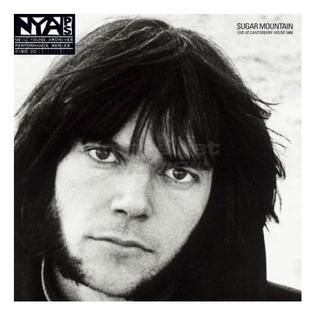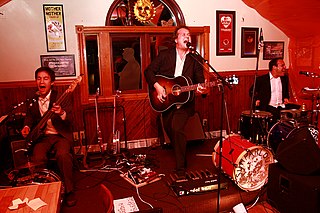
Os Mutantes are an influential Brazilian rock band that were linked with the Tropicália movement, a dissident musical movement during the Brazilian dictatorship of the late 1960s. The band is considered to be one of the main groups of Brazilian rock. Heavily influenced by Anglo-American psychedelic pop, they bridged Brazilian sensibilities together with studio trickery, feedback, distortion, and musique concrète. They released their now-acclaimed self-titled debut album in 1968.

Bossa nova is a relaxed style of samba developed in the late 1950s and early 1960s in Rio de Janeiro, Brazil. It is mainly characterized by a calm syncopated rhythm with chords and fingerstyle mimicking the beat of a samba groove, as if it was a simplification and stylization on the guitar of the rhythm produced by a samba school band. Another defining characteristic of the style is the use of unconventional chords in some cases with complex progressions and "ambiguous" harmonies. A common misconception is that these complex chords and harmonies were derived from jazz, but samba guitar players have been using similar arrangement structures since the early 1920s, indicating a case of parallel evolution of styles rather than a simple transference from jazz to bossa nova. Nevertheless, bossa nova was influenced by jazz, both in the harmonies used and also by the instrumentation of songs, and today many bossa nova songs are considered jazz standards. The popularity of bossa nova has helped to renew samba and contributed to the modernization of Brazilian music in general.

Vain Glory Opera is the third studio album by the German power metal band Edguy, released in 1998. It was mixed by Stratovarius' Timo Tolkki, who also played additional lead guitar on "Out Of Control", and featured additional lead and backing vocals by Hansi Kürsch of Blind Guardian on "Out of Control" and the title track "Vain Glory Opera." Further choir vocals were supplied by Ralf Zdiarstek and Norman Meiritz. At the time of recording the album, Edguy had not yet chosen a permanent drummer to succeed Dominik Storch. So session musician Frank Lindenthal, a good friend of the band, was asked to play drums on the album.

Arnaldo Dias Baptista is a Brazilian rock musician and composer.

The Psychedelic Sounds of the 13th Floor Elevators is the debut studio album by the 13th Floor Elevators. The album's sound, featuring elements of psychedelia, hard rock, garage rock, folk, and blues, is notable for its use of the electric jug, as featured on the band's only hit, "You're Gonna Miss Me", which reached number 55 on the Billboard Hot 100 with "Tried to Hide" as a B-side. Another single from the album, "Reverberation (Doubt)", reached number 129 on the Billboard's Bubbling Under chart.

"Fool in the Rain" is the third song on Led Zeppelin's 1979 album In Through the Out Door. It was the last single released in the US before they formally disbanded in 1980. The song reached number 21 on the Billboard Hot 100 on 16 February 1980.

Mutantes (transl. Mutants) is the second album by the Brazilian tropicalia band Os Mutantes. The album was originally released in 1969 and reissued in 1999 on Omplatten Records and again in 2006 by Omplatten's parent company, Universal Records. It shows a more polished approach than their first album, maintaining the sense of humour while keeping the experimental aspects, such as fusing different genres, studio trickery as well as using found objects and samples from television and movies.

A Divina Comédia ou Ando Meio Desligado is the third album by the Brazilian rock band Os Mutantes. The album was originally released in 1970 and reissued in 1999 on Omplatten Records and again in 2006 by Omplatten's parent company, Universal Records. The title in English means: The Divine Comedy or I Am a Bit Disconnected. "I am a bit disconnected" in this sense means "I feel a little spaced out." The second track features the band imitating California accents. The album as a whole is characterized by a mix of psychedelic and religious imagery.

Jardim Elétrico is the fourth album by the Brazilian Tropicália/psychedelic rock band Os Mutantes. The album was originally released in 1971 on Polydor Records. The title in English means Electric Garden. Five of the songs from this album were originally intended to be released on the album Tecnicolor, but that album was not released until 2000.

Cabeça Dinossauro is the third studio album by Brazilian rock band Titãs, released on 25 June 1986. It was their first album produced by Liminha, who was the director of WEA at the time of the album's recording, which facilitated the relationship between band and label; and their first gold album, certified as such in December 1986.

Tudo foi Feito pelo Sol is the sixth album by the Brazilian rock band Os Mutantes. The only original member of the band to take part in the recording of this album was guitarist Sérgio Dias.

Cannonball's Bossa Nova is a 1962 album by jazz musician Julian "Cannonball" Adderley. First released on Riverside in 1963, the album was reissued on Capitol Records several times with different covers and titles.

Sugar Mountain – Live at Canterbury House 1968 is a live album by Canadian-American musician Neil Young. On November 8–10, 1968, Young performed three solo acoustic shows at Canterbury House in Ann Arbor, Michigan. The album is compiled from the performances on the 9th and 10th.

Dethalbum II is the second full length album by virtual band Dethklok, from the animated series Metalocalypse. The CD and deluxe CD/DVD were released on September 29, 2009. The album was later released on LP to the United States and Canada.

Sunparlour Players are a Canadian alternative country band. Based in Toronto, Ontario, the band consists of songwriter Andrew Penner on lead vocals, guitar, bass, banjo, bass organ pedals, percussion, and kick drum and Michael "Rosie" Rosenthal on drums, glockenspiel, banjo, backing vocals, keyboards and bass. They come from Ontario. Andrew Penner grew up on a farm near Leamington, in the region nicknamed Canada's "Sun Parlour".

In a Different Light is a 2009 album by the band Everclear. It is the band's first album with label 429 Records. The album features re-recordings of songs from the band's previous albums, performed in a more stripped down and acoustic fashion, as well as two previously unreleased songs, "At the End of the Day" and "Here Comes the Darkness".

Territory is the third full-length studio album by Canadian indie rock band Two Hours Traffic, and the follow-up to their Polaris Prize-nominated Little Jabs. It was released on September 8, 2009 on Bumstead Records. The album was produced by Joel Plaskett. The band toured Canada in September and October 2009 in support of the album.

Canibália is Daniela Mercury's ninth studio album, released on October 23, 2009, in Brazil by Sony Music. It was released on October 24 in the United States and on October 27 in the European Union. Mercury's first studio release in four years brings not only an eclectic sound, but also five different covers.

Privateering is the seventh solo studio album by British singer-songwriter and guitarist Mark Knopfler, released on 3 September 2012 by Mercury Records. The first studio double-album of Knopfler's 35-year career as a recording artist, Privateering consists of 20 original songs, and integrates blues rock with traditional folk and country genres. Recorded between March and December 2011, the album received generally positive reviews throughout Europe, and reached the number one position on album charts in Austria, Germany, Norway and the Netherlands, as well as the number two or three position in Belgium, Italy, New Zealand, Poland, Spain, Sweden and Switzerland. The album peaked at number eight in the United Kingdom. The album was released in North America a full year after its European release due to a contractual dispute between Knopfler and his North American distributors.

Fool Metal Jack is the tenth studio album by the Brazilian rock band Os Mutantes. Released on April 30, 2013 by the US-based label Krian Music Group, it is the follow-up to Haih Or Amortecedor, Os Mutantes' first studio album in 35 years.




















